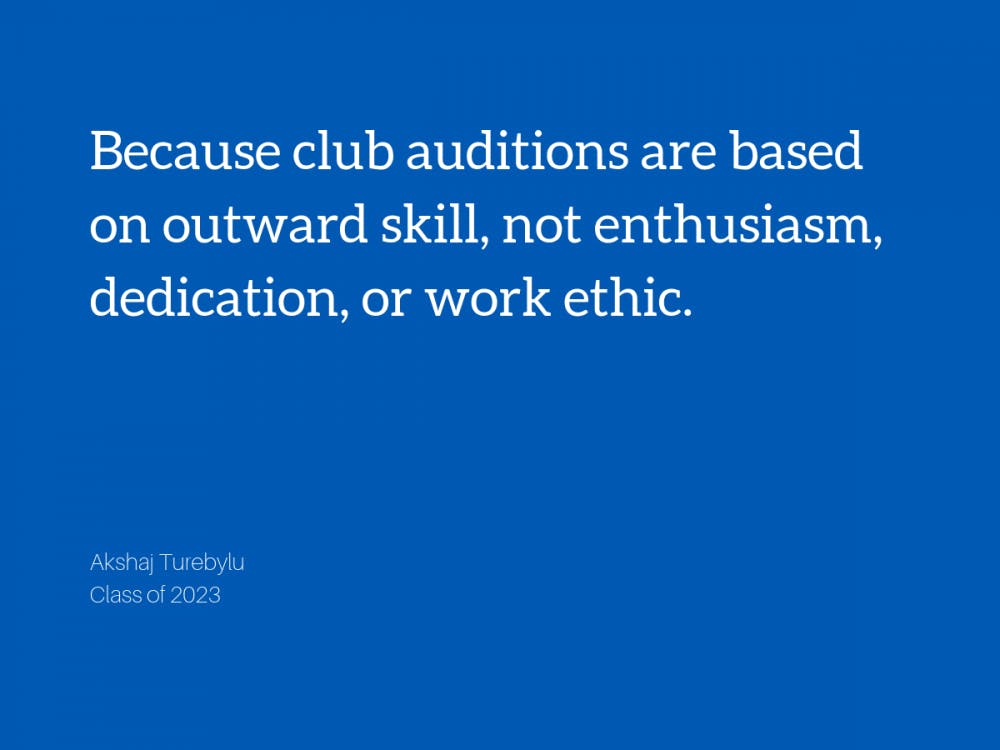In the past two weeks, I have learned that many student organizations at Duke are rather exclusive. Many of them require auditions. Some of my auditions went well, others not so much. As fate would have it, I didn’t qualify for anything.
Let’s step back. Coming to Duke two weeks ago was both exciting and exhausting. Any freshman can tell you how disorienting the first several days were with meetings, information sessions, and the need to understand life at Duke. This confusion soon subsided, and I began asking, what’s here, what more can I do? I realized I didn’t have anything to do except plan for class; I needed extracurriculars.
I went with my gut instinct at the beginning of the semester. Sign up for everything, cut clubs out later. And it was fun to sign up for things—until about two weeks ago—when emails and invitations started piling in. Every day of the week was filled with interest meetings and auditions. It was a bit overwhelming, kind of like O-Week.
Unfortunately, my plan did not work out quite as I had hoped. Instead of being able to pick and choose between my options, I was scrambling to see if I had qualified for anything (which, as you know, I had not).
Some of you might believe it was not fate, but rather my lack of skill, that led to this result. And that would probably be a fair assessment; I bombed my debate rebuttal, couldn’t act energetically for comedy, and wasn’t convincing enough for Mock Trial. Luckily, I found a good number of clubs that don’t have auditioning processes that I enjoyed; so things worked out fine for me.
Still, I was intrigued by the system itself. Does it make sense to have an intensive vetting process for clubs at Duke? The effects of such a practice are sure to be felt by students, clubs themselves, and even the University.
For the club, being exclusive means… exclusivity. Members are already of a high caliber—they don’t have large gaps in skill to account for. Fresh students are far less a burden and practice can immediately start honing skills; at the same time, they lose access to beginner students and new perspectives. For many of the extremely competitive clubs, this system seems to have been embraced wholesale.
For students, it means that there is no guarantee that you will be admitted into the club of your choice, or that you will be able to compete/practice in the activity of your interest. It also means that, if admitted, you are now part of a group that excels in a certain category and can start learning from experienced upperclassmen without sharing your time with less talented beginners. It is a winner takes all system.
For the University, this makes teams more competitive while also incentivizing the creation of new clubs/teams. It was interesting to hear the story of comedy clubs at Duke from an advisor of mine. The Inside Joke was made partly due to the “cliquey-ness” of Duke University Improv; and this year, DUST (Duke University Stand-Up Troupe), an open comedy club, formed largely in reaction to the “cliquey-ness” of Inside Joke. Are all clubs destined to become extremely selective? Will it only be a few more years until DUST also requires stand-up auditions from members hoping to join?
It’s important to remember just how many amazing some of our open spaces are at Duke. Anyone can come to Chapel service, we have plenty of club and IM sports, and there is, of course, the common room. There is still definitely community without being in a competitive group; what do students lose through the audition process?
They lose the chance to try. Not to “try-out,” but to really try. To attempt debate, ultimate frisbee, or any other competitive activity — to see how good they might be. To see if they even enjoy the club at all. Because club auditions are based on outward skill, not enthusiasm, dedication, or work ethic. I did bungle my debate rebuttal, but is that really indicative of my overall potential in debate? The most competitive members of any group usually start at the bottom and improve over time. Charlie Parker supposedly bombed one of his first auditions to play live music. Of course, he then became the (at least one of the) greatest jazz alto saxophonists of all time.
A club that allowed many members to try the activities for a few weeks until auditions began, or until they simply chose to stop attending, would have a more accurate reading of both skill and dedication among its members. There would be greater cost in dealing with a larger base to begin with, but perhaps the pay off would be worth it.
Or maybe I just really wanted to get into Mock Trial.
Akshaj Turebylu is a Trinity first-year. His column, “ways and means,” typically runs on alternate Fridays.
Get The Chronicle straight to your inbox
Signup for our weekly newsletter. Cancel at any time.

